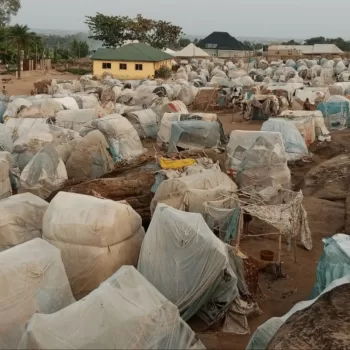
IDPs: The Internally Displaced Persons (IDPs) in Benue State, specifically in the Agagbe camps located in the Gwer West Local Government Area, are facing immense suffering. This article sheds light on the dire situation of the IDPs, who are grappling with severe shortages of healthcare, clean water, sufficient food, and proper shelter. The lack of these basic necessities has led to preventable deaths and a deteriorating health crisis within the camps.
Healthcare Crisis in the IDP Camps
According to Jacob Terna Ibaah, the Coordinating Chairman of the Agagbe camps, there is a significant absence of healthcare facilities to cater to the needs of the IDPs. This critical deficiency in medical services has resulted in several avoidable deaths. Expectant mothers have been forced to give birth in unsanitary conditions, including camp restrooms, due to the lack of funds and resources for proper medical assistance.
The IDP camps are plagued by various diseases such as measles, malaria, and diarrhea. Sadly, the absence of healthcare exacerbates the spread of these illnesses, further endangering the lives of the displaced population. Immediate attention and intervention are required to prevent further loss of life.
Water Scarcity and Contamination
One of the most pressing challenges faced by the IDPs is the scarcity of drinkable water. The only available water source in the camps is a nearby stream. However, investigations have revealed that this stream is the primary cause of the rampant infections within the camps. The lack of access to clean water not only contributes to the spread of diseases but also poses a significant threat to the overall well-being of the IDPs.
Insufficient Food Supplies
Another critical issue in the IDP camps is the shortage of food. The displaced population struggles to obtain an adequate supply of nourishing meals on a daily basis. The scarcity of food further weakens the already vulnerable IDPs, making them susceptible to malnutrition and other associated health complications. Urgent measures need to be taken to ensure a consistent and sustainable food supply for the displaced individuals.
Read Also: Governor Alia’s Snail-Paced Government Faces Criticism Over Cabinet Delay
Inadequate Shelter Conditions
The IDPs in Benue State also face dire circumstances regarding shelter. Many of them are forced to live in overcrowded and substandard conditions, such as primary schools, secondary schools, former convents, and even abandoned police stations. These inadequate living arrangements not only compromise the privacy and dignity of the displaced individuals but also contribute to their vulnerability to various health risks.
Efforts by State Administration and Humanitarian Organizations
While the situation is dire, the state administration, along with organizations like Doctors Without Borders and other development partners, has made commendable efforts to address the challenges faced by the IDPs in Benue State. However, it is crucial to recognize that more needs to be done to alleviate the plight of the displaced population. Increased funding, collaboration, and comprehensive strategies are necessary to improve the overall living conditions and well-being of the IDPs.
Conclusion
The IDPs in Benue State are enduring immense suffering due to the lack of adequate healthcare, clean water, sufficient food, and proper shelter. The absence of essential services has resulted in preventable deaths and a deteriorating health crisis within the camps. Urgent intervention is required to address these challenges and ensure the well-being of the displaced population. The state administration, humanitarian organizations, and the global community must work together to provide the necessary resources and support to alleviate the plight of the IDPs in Benue State.











